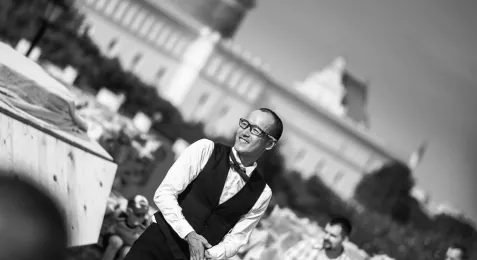Lublin Info Centre
European Capital of Culture – Lublin Gears Up for ECoC 2029 with strong academic support!

The unity around the goal of achieving the title of European Capital of Culture builds our city’s strength. Representatives from businesses, NGOs, academia, and local government are joining forces and collaborating in the spirit of our application’s guiding idea of RE:Union. I thank the rectors of all nine Lublin universities for supporting our efforts in the competition and committing to cooperation. Academia is one of the pillars of Lublin’s development and a priority of the Lublin 2030 Strategy. Therefore, in the context of ECoC, collaboration with Lublin’s academic environment assumes particular importance. In this way, we clearly emphasize Lublin’s cultural and intellectual capital, contributing to building a positive image of an open and welcoming city for its residents, inhabitants, and visitors, thereby increasing the chances of obtaining the title of European Capital of Culture 2029, said Dr. Krzysztof Żuk, Mayor of Lublin.
The essence of the letter of intent signed by the universities and the City, aimed at securing the title of ECoC 2029, lies in implementing actions based on mutual understanding and intercultural dialogue, as well as highlighting Lublin’s shared cultural heritage. Academia is a cornerstone of the city’s development and a priority of the Lublin 2030 Strategy. Therefore, cooperation with Lublin’s universities assumes particular significance in the context of ECoC. Under the banner “RE: UNION” (the guiding motto of Lublin’s application), through partnership and complementarity, the parties demonstrate their commitment to the city’s future and the well-being of its residents.
The meeting was attended by members of the team developing Lublin’s competition application, representatives of the academic community, and local government. Each of Lublin’s universities was represented by:
- Prof. Dr. Radosław Dobrowolski – Rector of Maria Curie-Skłodowska University in Lublin
- Prof. Dr. Krzysztof Kowalczyk – Rector of University of Life Sciences in Lublin
- Prof. Dr. Wojciech Załuska – Rector of Medical University of Lublin
- Dr. Maria Mazur, Prof. WSPA – Rector of University of Entrepreneurship and Administration in Lublin
- Dr. Hab. Mariusz Korczyński, Prof. AWP – Rector of Applied Sciences Academy Wincentego Pola in Lublin
- Dr. Emilia Żerel, Prof. ANSiM – Rector of Academy of Social and Medical Sciences in Lublin – Academy of Applied Sciences
- Dr. Hab. Beata Piskorska, Prof. KUL – Vice-Rector of John Paul II Catholic University of Lublin
- Prof. Dr. Eng. Paweł Droździel – Vice-Rector of Lublin University of Technology
- Dr. Mariusz Paździor, Prof. WSEI Academy – Vice-Rector of WSEI Academy in Lublin

Lublin is among the shortlisted finalists for the title of European Capital of Culture 2029, along with Kołobrzeg, Bielsko-Biała, and Katowice. The city has until the end of July to develop its application. The decision on which city will be designated as the European Capital of Culture 2029 will be announced in September 2024.
The title of European Capital of Culture is temporary; the selected Polish city will hold it in 2029. The winner is chosen five years prior to the celebrations, followed by several years of preparation. The city, together with the Lublin Culture Center as the coordinator of the application, is already planning its actions.
Lublin’s academic potential is significant:
- Close to 60,000 students
- 9 universities, including 5 public and 4 private
- Over 200 study programs at public and private universities (including artistic and creative disciplines)
- Over 9,000 international students from over 100 countries
- Over 15,000 graduates annually
Lublin ranks among the top academic centers in Poland in terms of student numbers and is the largest in the eastern part of the country. It hosts 5 public and 4 private universities, distinguished not only by the highest number of students in the Lublin Voivodeship but also by impressive scientific and research achievements recognized both nationally and internationally. Despite the national trend of declining student numbers, linked in part to demographic changes in the country, the number of students studying in Lublin remains stable, while the number of international students continues to grow—accounting for over 11% in the academic year 2019/2020 and 15.5% in the academic year 2023/2024.







